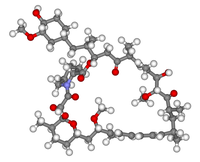
Photo from wikipedia
The mechanistic target of rapamycin (mTOR) signaling pathway is the central regulator of cell growth and proliferation by integrating growth factor and nutrient availability. Under healthy physiological conditions, this process… Click to show full abstract
The mechanistic target of rapamycin (mTOR) signaling pathway is the central regulator of cell growth and proliferation by integrating growth factor and nutrient availability. Under healthy physiological conditions, this process is tightly coordinated and essential to maintain whole-body homeostasis. Not surprisingly, dysregulated mTOR signaling underpins several diseases with increasing incidence worldwide, including obesity, diabetes and cancer. Consequently, there is significant clinical interest in developing therapeutic strategies that effectively target this pathway. The transition of mTOR inhibitors from the bench to bedside, however, has largely been marked with challenges and shortcomings, such as the development of therapy resistance and adverse side effects in patients. In this review, we discuss the current status of first, second and third generation mTOR inhibitors as a cancer therapy in both pre-clinical and clinical settings, with a particular emphasis on the mechanisms of drug resistance. We focus especially on the emerging role of diet as an important environmental determinant of therapy response, and posit a conceptual framework that links nutrient availability and whole-body metabolic states such as obesity with many of the previously defined processes that drive resistance to mTOR-targeted therapies. Given the role of mTOR as a central integrator of cell metabolism and function, we propose that modulating nutrient inputs through dietary interventions may influence the signaling dynamics of this pathway and compensatory nodes. In doing so, new opportunities for exploiting diet/drug synergies are highlighted that may unlock the therapeutic potential of mTOR inhibitors as a cancer treatment.
Journal Title: Endocrinology
Year Published: 2022
Link to full text (if available)
Share on Social Media: Sign Up to like & get
recommendations!